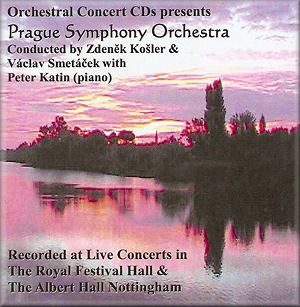 |
 |
|

Availability
CD: Orchestral
Concerts
|
William WALTON
(1902-1983)
Scapino; overture (1940) [8:19]
Sergei PROKOFIEV (1891-1953)
Piano Concerto No. 3 in C major Op. 26 (1917-21) [28:37]
Miloslav KABELÁČ
(1908-1979)
Reflections Op.49 [15:13]
Maurice RAVEL (1875-1937)
Rapsodie espagnole (1907-08) [16:26]
Antonín
DVOŘÁK (1841-1904)
Slavonic Dances, op.72 (1887) - No.15 [3:05]
 Peter Katin (piano)
Peter Katin (piano)
Prague Symphony Orchestra/Zdeněk Košler, Václav
Smetáček (Kabeláč)
rec. live 8 February 1967, Royal Festival Hall (Walton, Prokofiev)
, 6 March 1968 Royal Festival Hall (Kabeláč), 13 February
1967, Albert Hall, Nottingham (Ravel, Dvořák)
 ORCHESTRAL CONCERTS CD2/2008 [71:43]
ORCHESTRAL CONCERTS CD2/2008 [71:43] 
|
|
|
Souvenirs of Czech and other orchestras’ visits to Britain
in the 1960s are advancing in fascinatingly ardent ranks via
this small outfit. One advantage is the opportunity thus accorded
to the Brno or, as here, to the Prague Symphony, bands that
toured frequently at the time but which were on a lesser known
footing than the monolithic esteem garnered by the Czech Phil.
If that addresses a historic wrong in this respect, well and
good. Those who know these orchestras principally for their
work with native music, on Supraphon and Panton, can now hear
them on tour, stretching out, taking repertoirial risks - being
an orchestra, in other words, and not the necessarily distorted
ensemble one imagines from their recordings of Czech music.
It’s not as if they played only Fibich and Dvořák
all week long.
Take for instance the Royal Festival Hall performance of Walton’s
Scapino presided over by Zdeněk Košler. This
bristling, bustling curtain-raiser to the February 1967 concert
announces an unabashed salute to the host’s own traditions.
The cymbal swishes register powerfully as the band dips their
collective tail into the vitality and caprice of Walton’s
saucy opus. It’s a feature of the series that we cannot,
in the main, hear whole concerts; that would involve two disc
sets. But the Walton was followed by Peter Katin’s splendidly
imaginative and digitally elevated performance of Prokofiev’s
Third Concerto. Some Czech composers of the mid-century had
a virtual obsession with Prokofiev, and this was partially at
least reflected in performances, so it’s no surprise to
find the Prague Symphony touring this work. In Katin they had
a splendid exponent, whose legerdemain is matched by an acute
structural sense, and whose tonal qualities are laudable. The
ensemble between pianist and orchestra is pretty solid. The
piano’s treble sonorities against the high winds are a
notably successful feature of a recording that in no small degree
manages to bring some warmth to the hall’s acoustic. Katin’s
take on the slow movement is very different from the composer’s
own laconic brilliance - but that’s true of almost all
subsequent traversals. And as befits the man who so successfully
brought us a famed Khachaturian concerto with Hugo Rignold for
Everest, Katin and his Czech colleague play with dynamism and
witty hauteur in the finale. The keen edge to the orchestra’s
sound bites nicely.
Kabeláč’s Reflections was conducted by Václav
Smetáček at the same hall, the following year. It’s
a variational work, ranging from Bardic fanfares, to percussion
militancy to rather more filmic inspirations. A piano is integrated
into the sound spectrum. We hear a fusion of cool reflection
and swirling advance. There’s certainly plenty of colour
and incident, and it could even be the film music for some tough,
black and white Czech historical epic, albeit one of a somewhat
more radical caste of mind.
The Ravel is hardly Stokowskian in its sense of fantasy or colour.
There’s a sound blip at 2:22 where things lose focus very
briefly. Later at 14:27 the sound flickers and only really re-establishes
itself a minute later. This is a notably well-drilled performance
however, with the brass on strong, engaged form, the strings
hardly evincing luxurious Philadelphian arch but offering instead
their own more contained perspectives. The encore is Dvořák,
from the same concert. Fizzy and exciting!
So ends another engaging entrant that offers an overture, a
concerto, two symphonic works and an encore.
Jonathan Woolf
|
|















